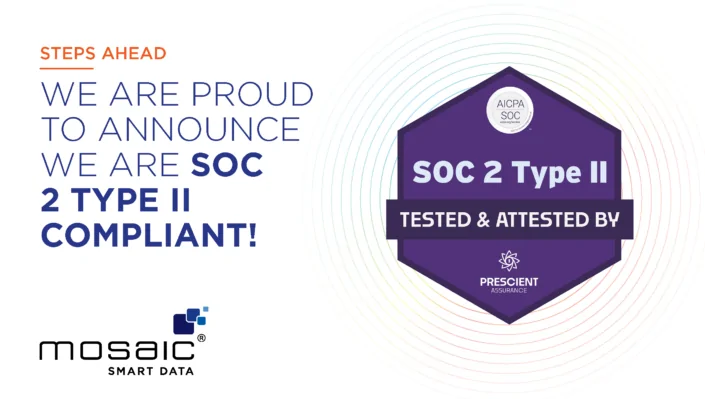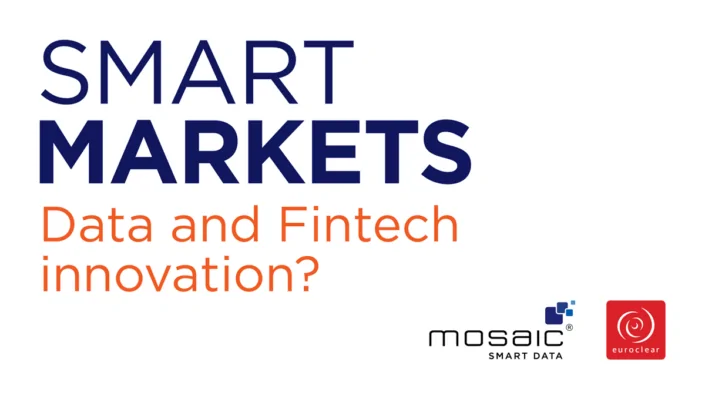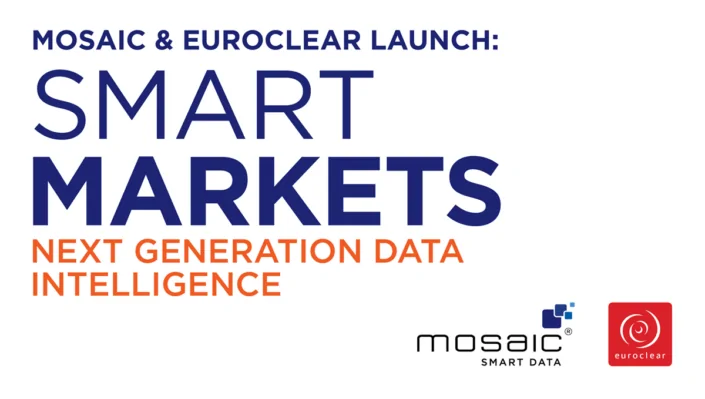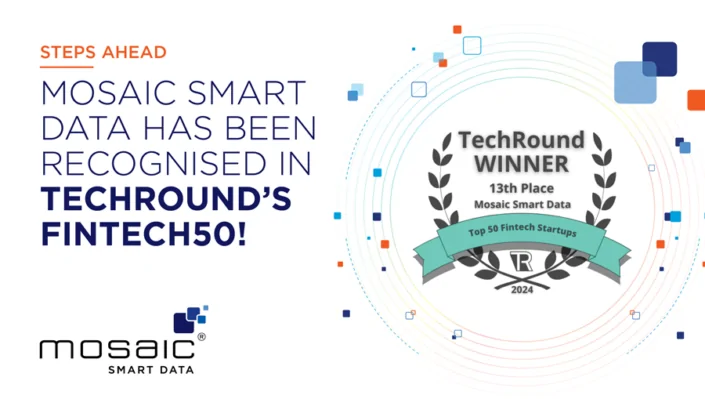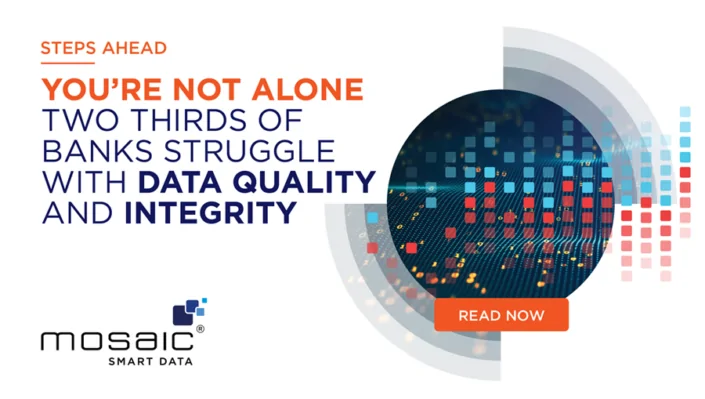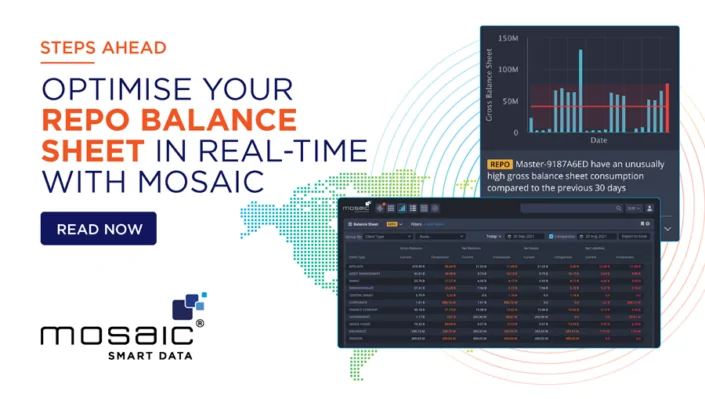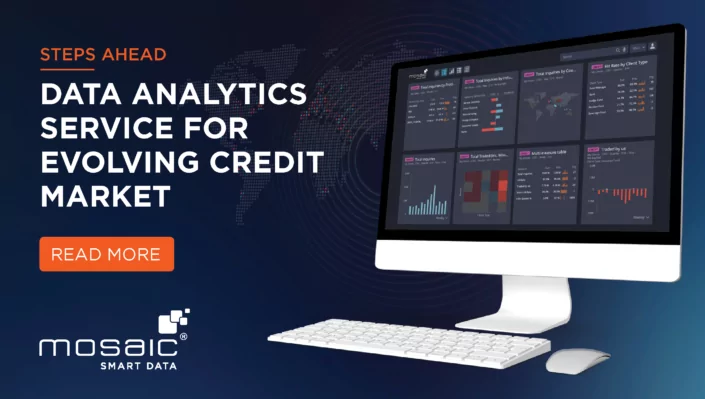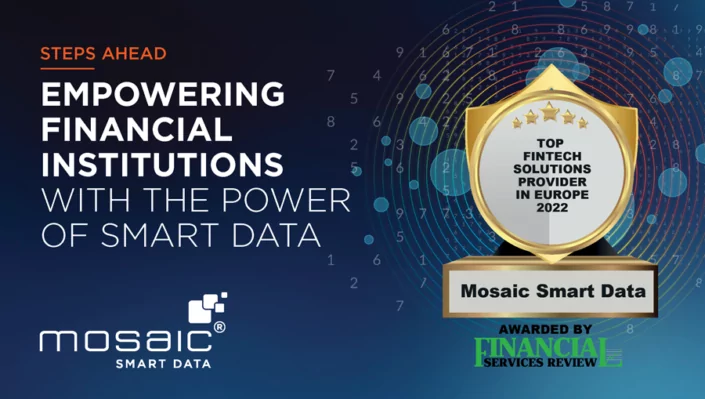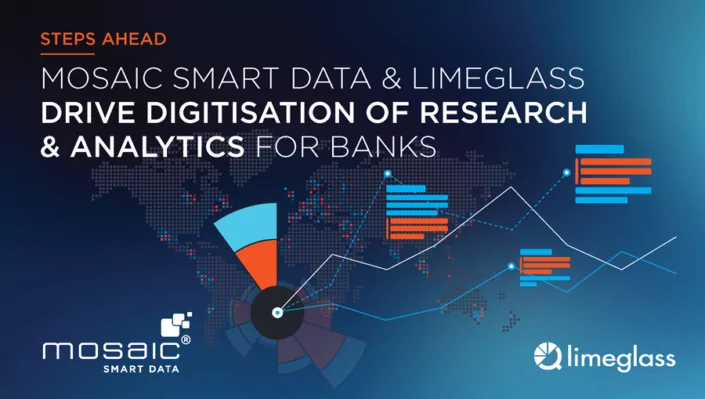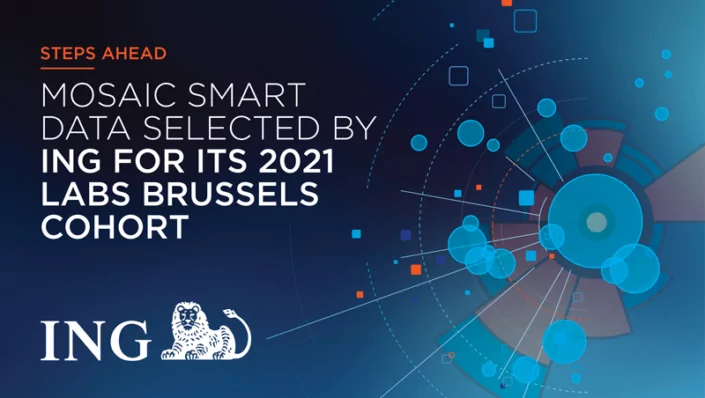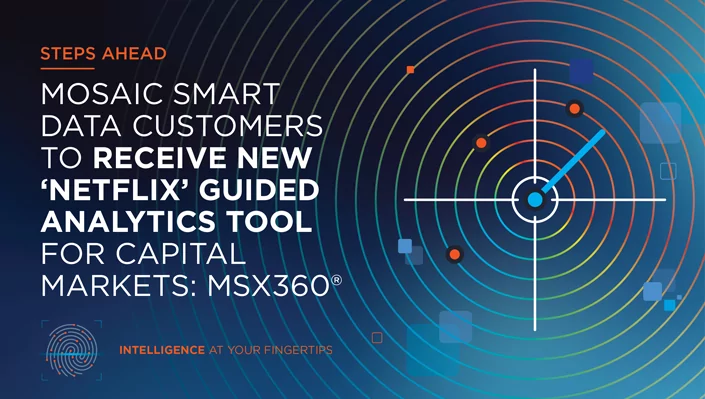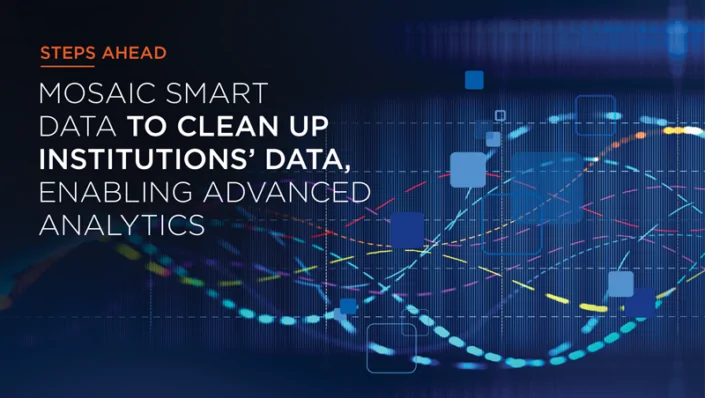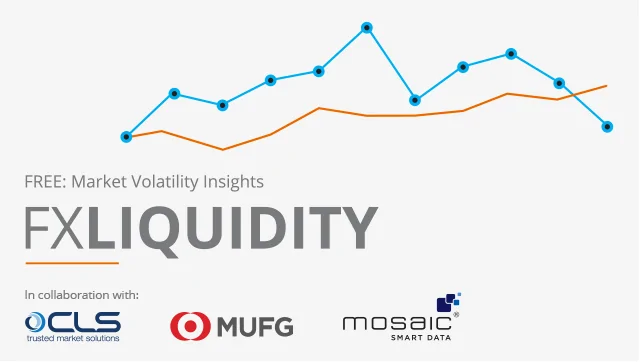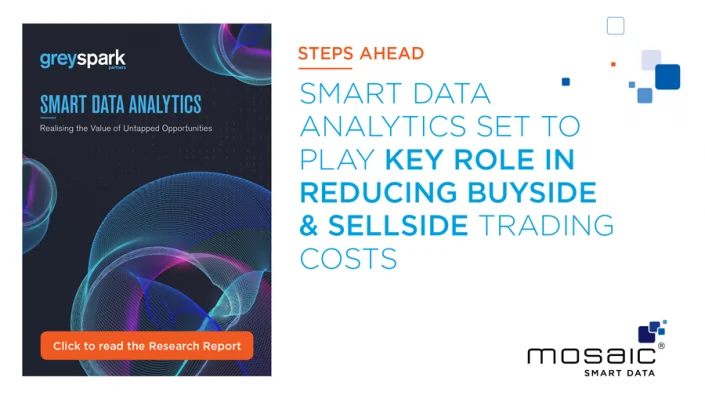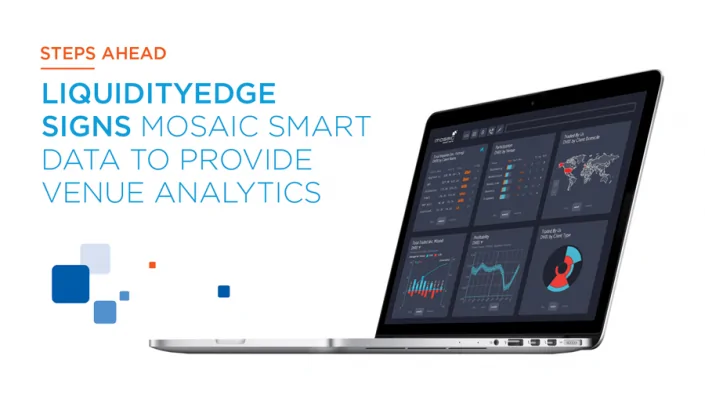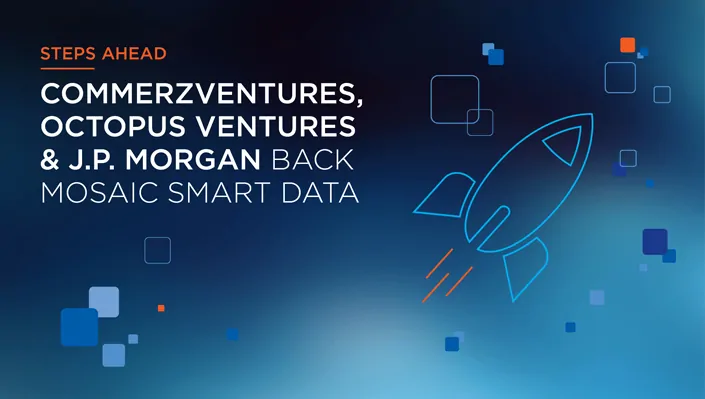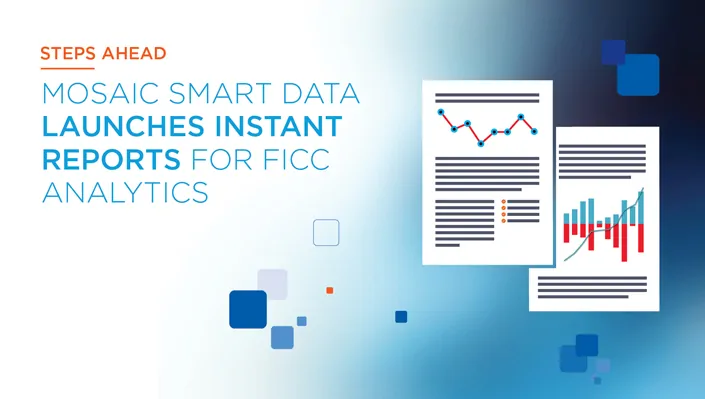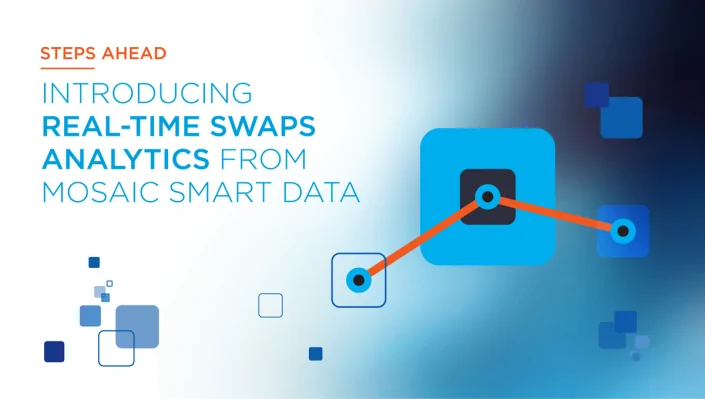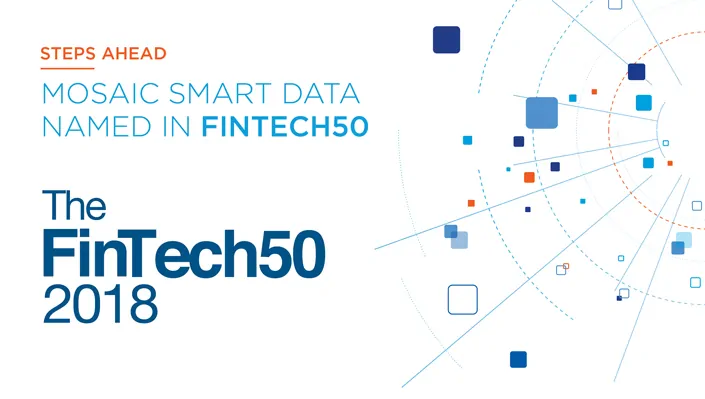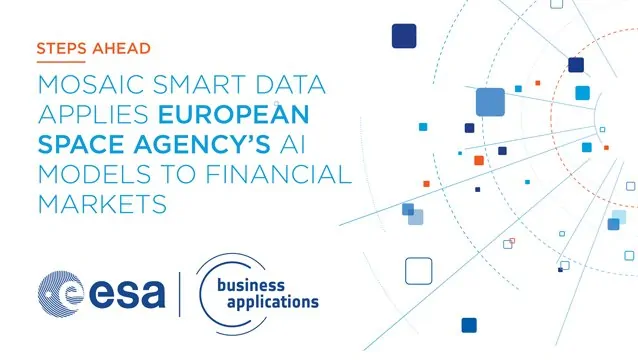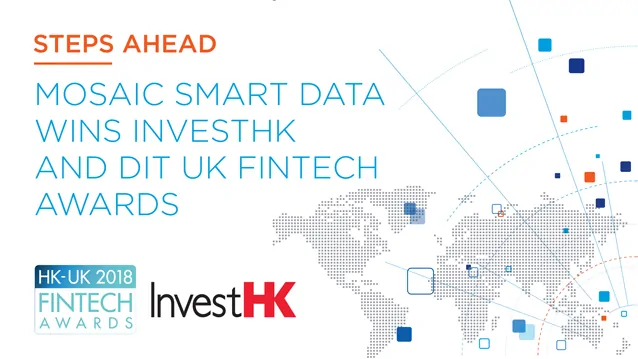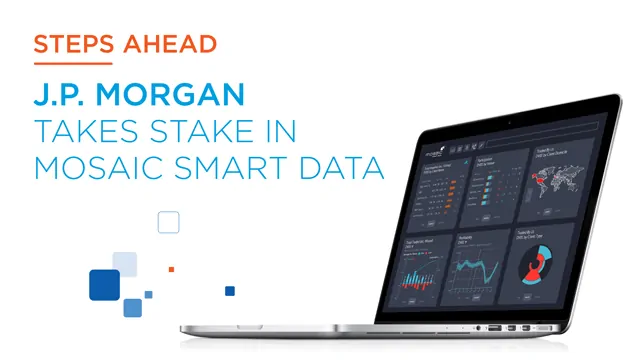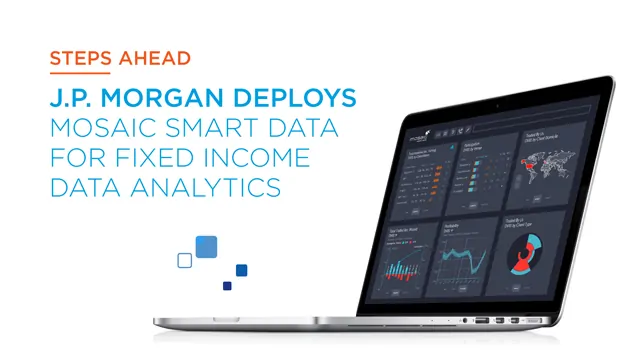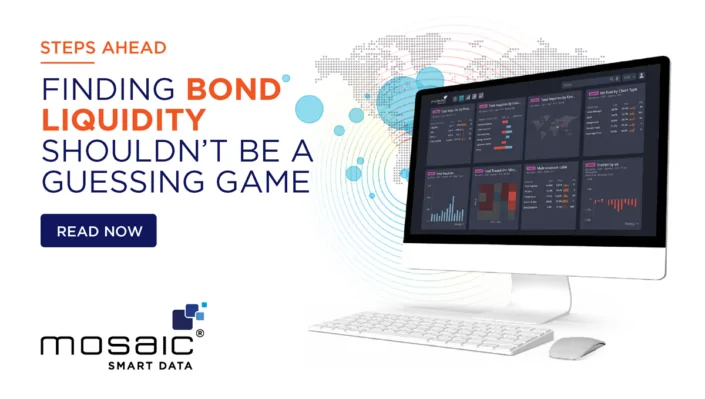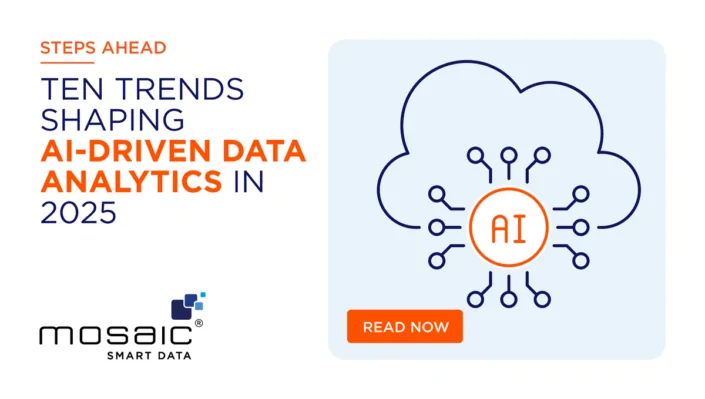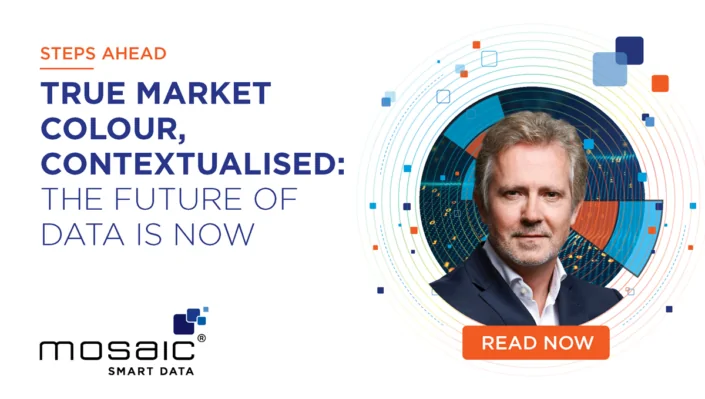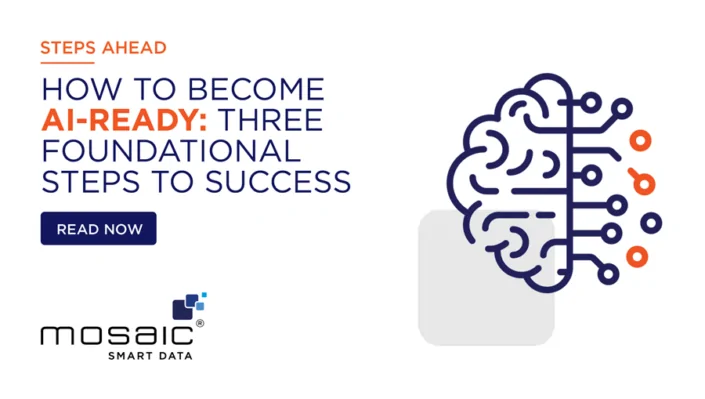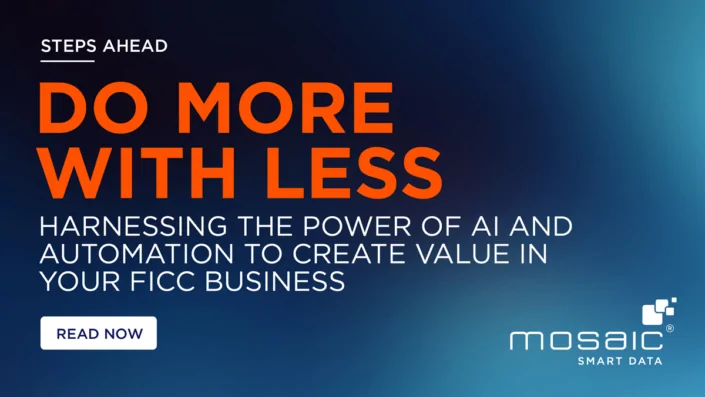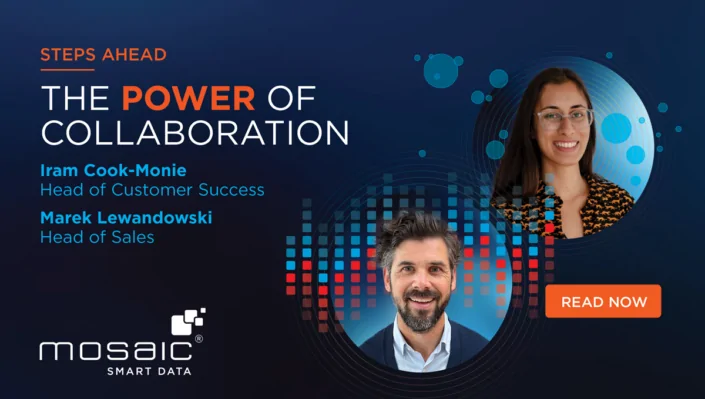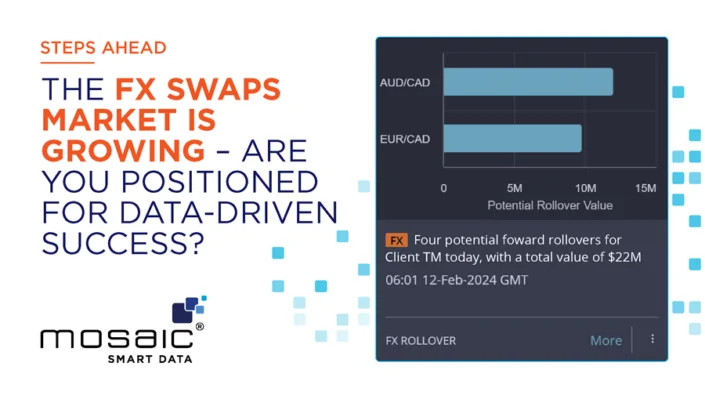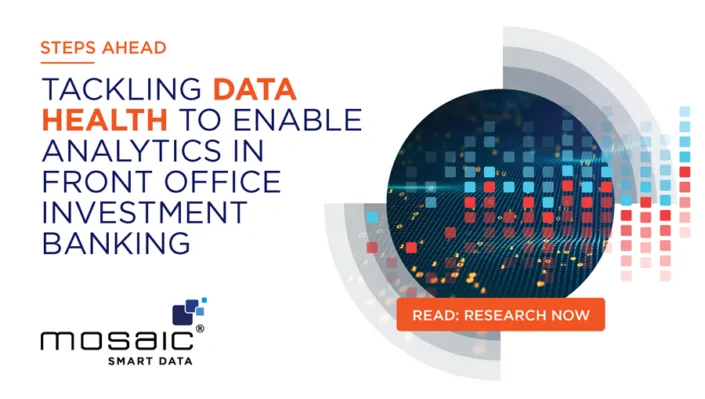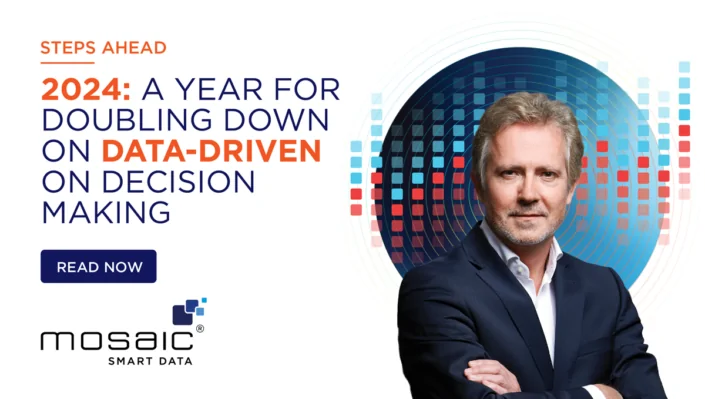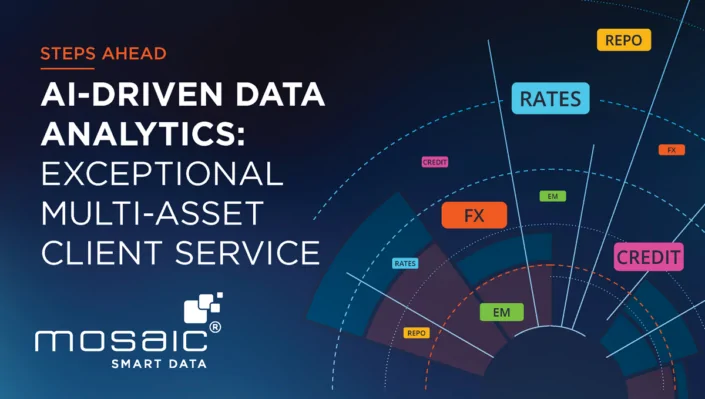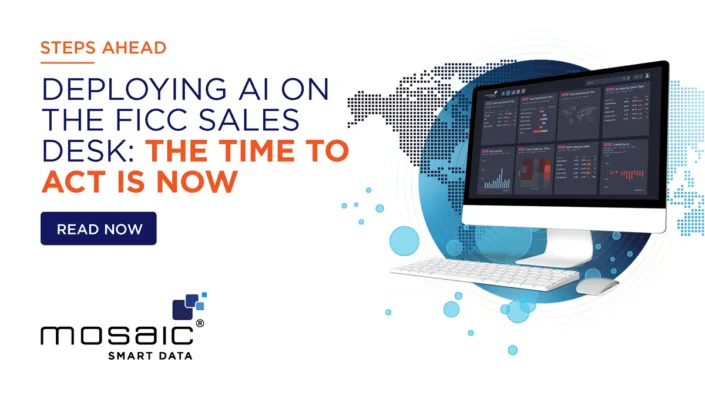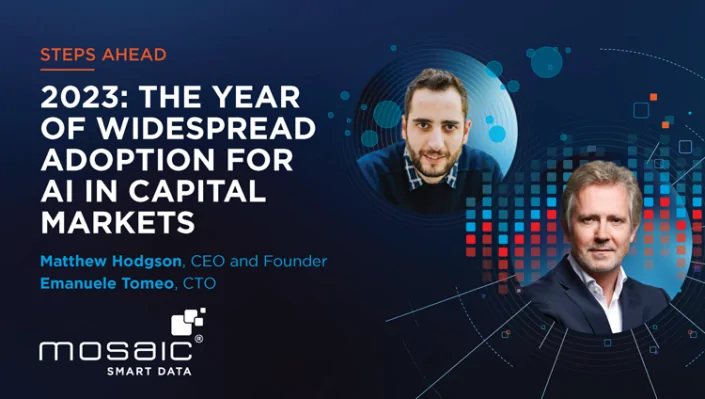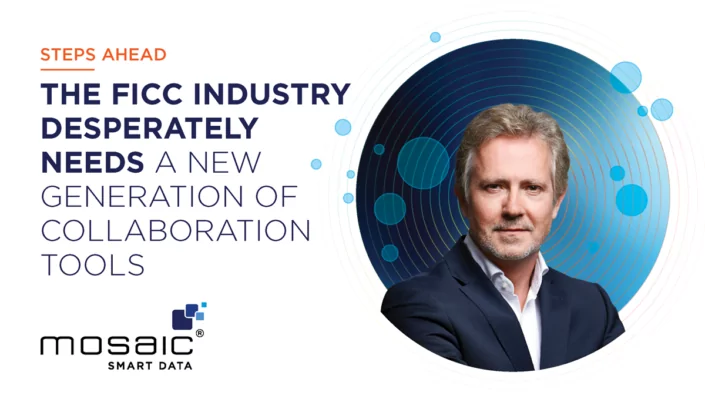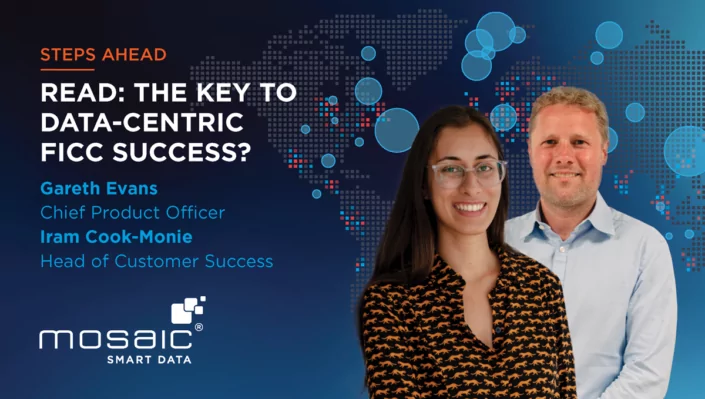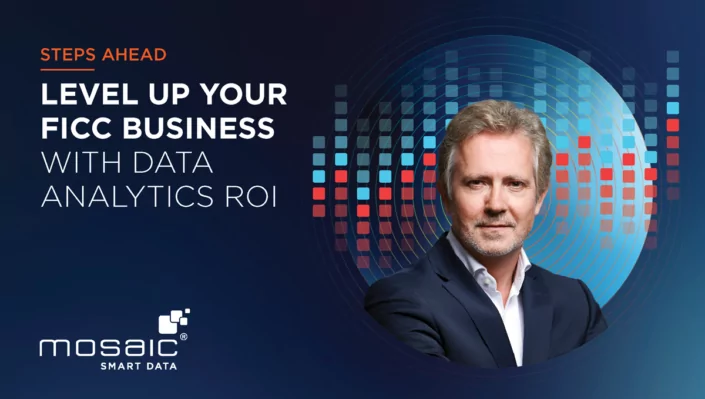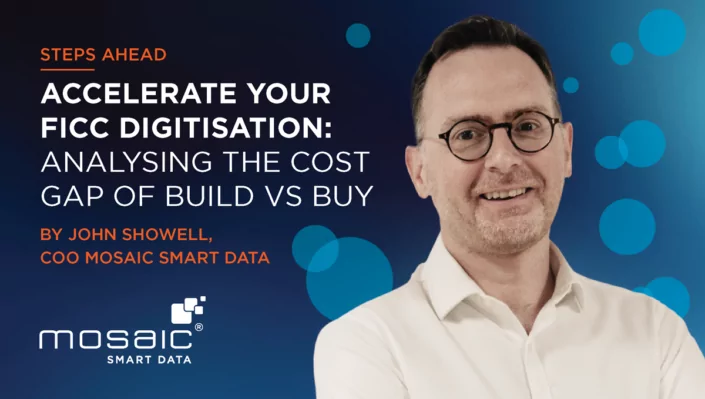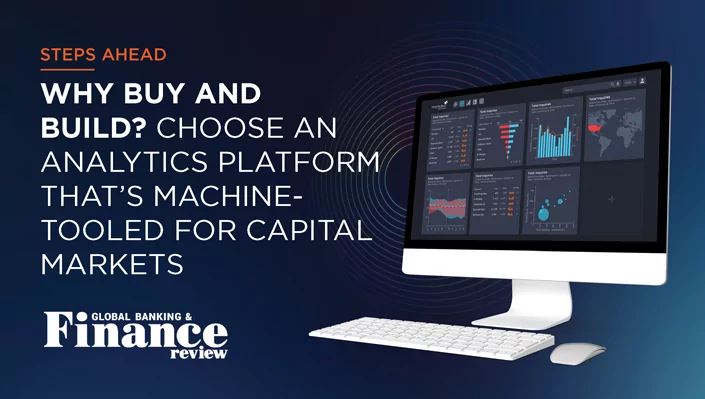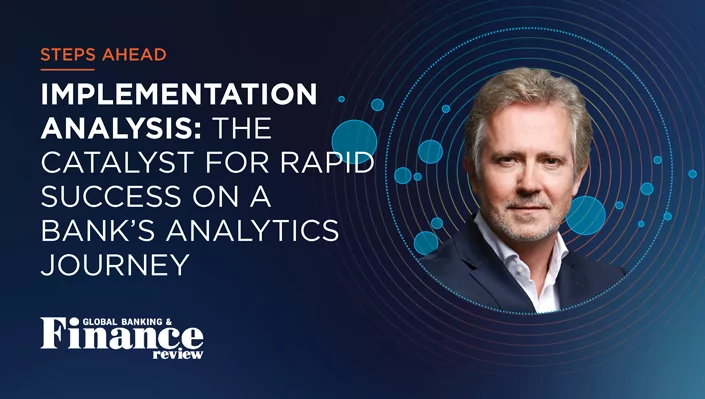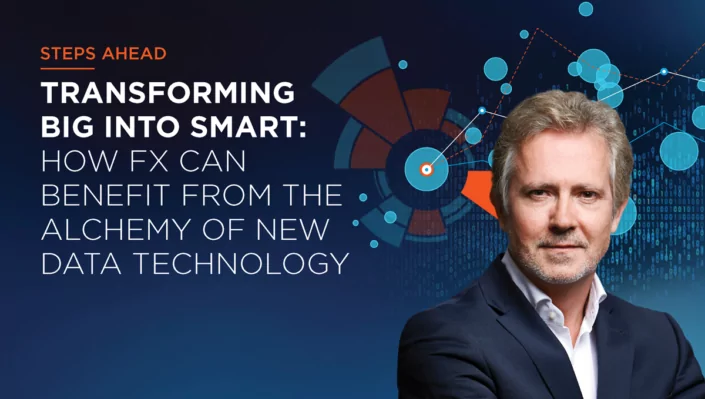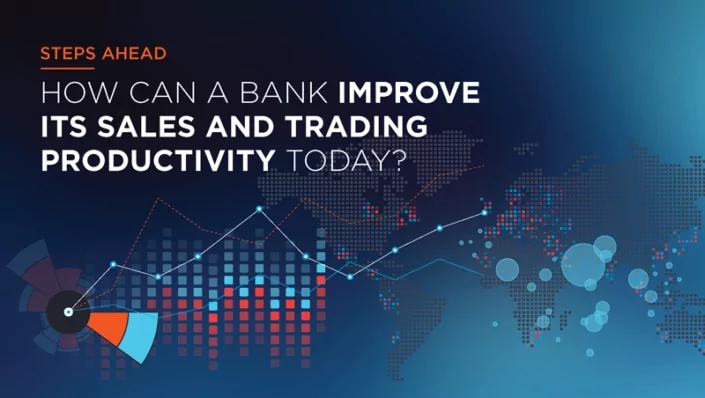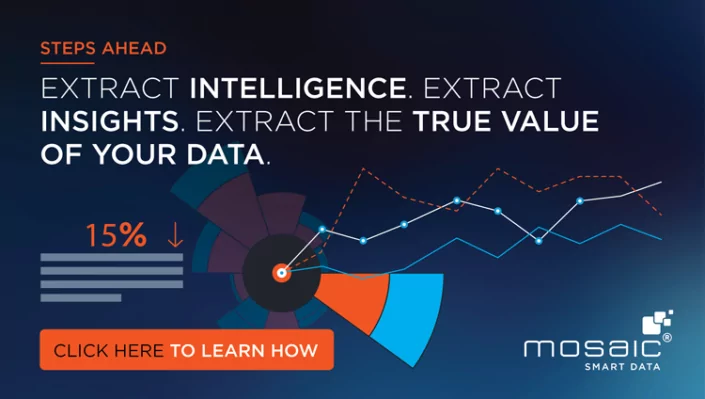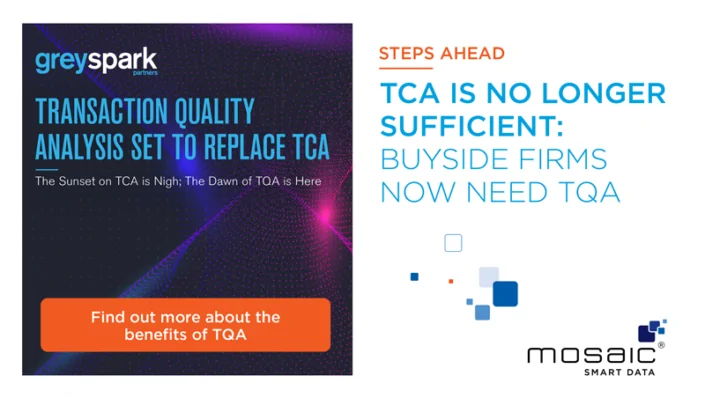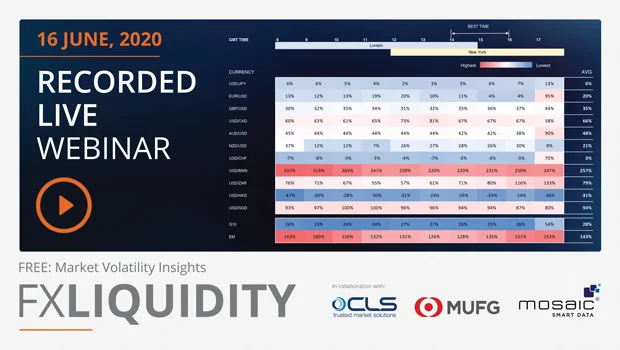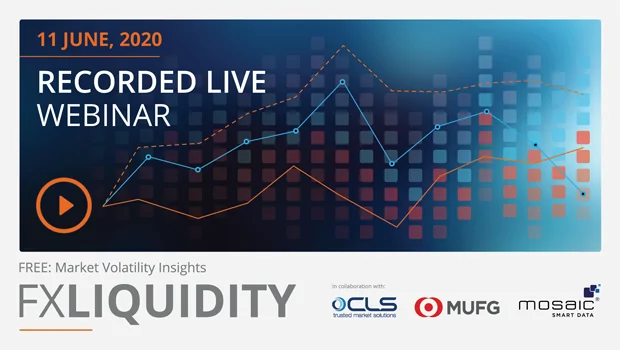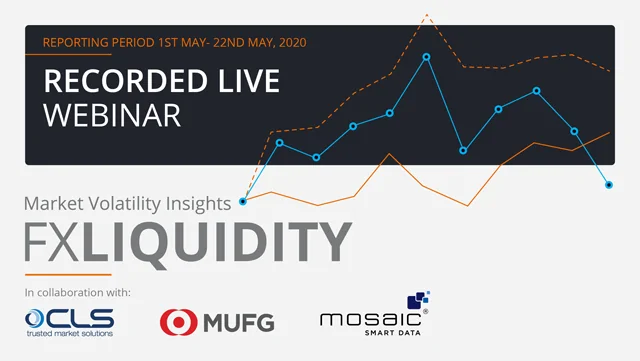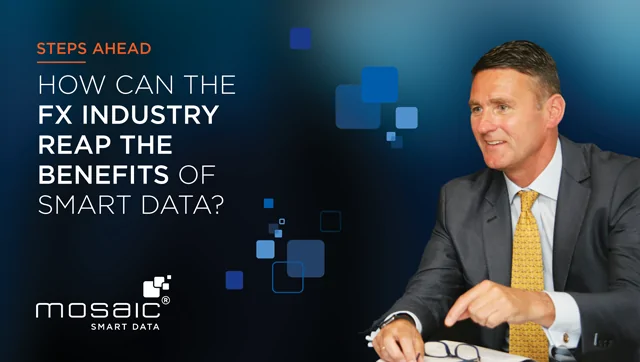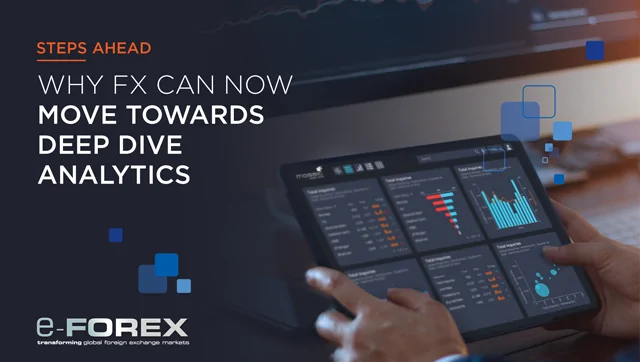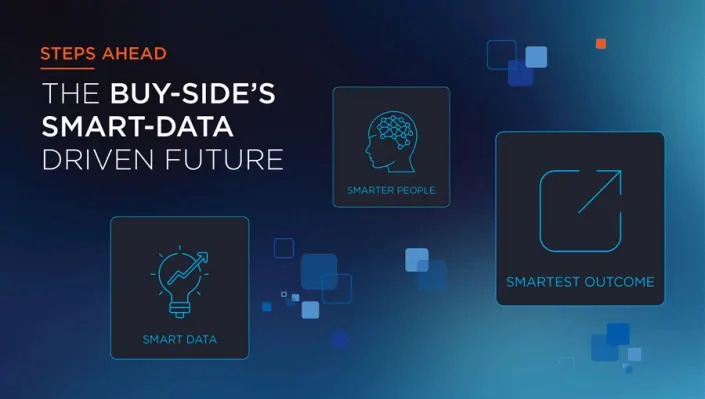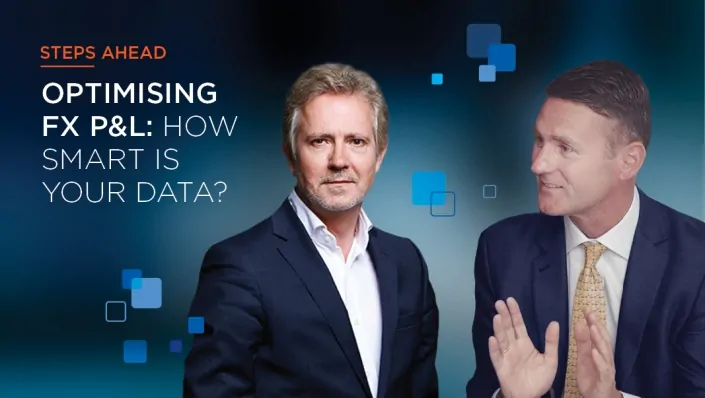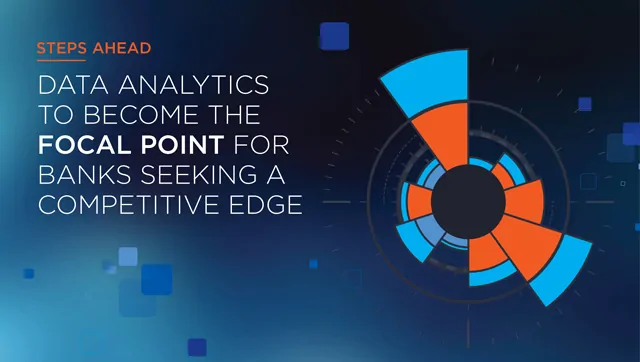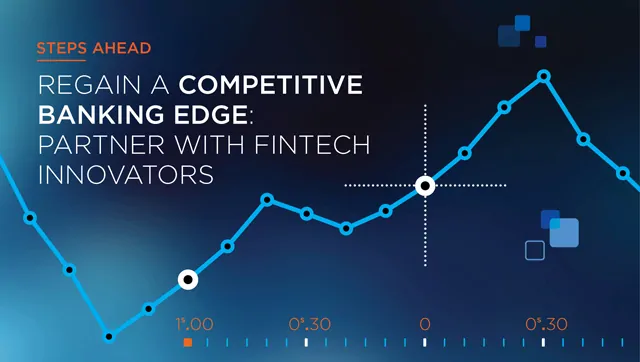Steps Ahead
Data: From Big Chaotic to Smart Profitable
By Matthew Hodgson, CEO and founder of Mosaic Smart Data
One thing FICC businesses have no shortage of is data. Unfortunately, while it may be big data, it is all too often also chaotic data. However, as Matthew Hodgson – Founder & CEO of Mosaic Smart Data – explains, transforming this into smart data also transforms it from being valueless – or even a liability – into a profitability driver.
Opportunity costs of inaction
FICC businesses have been hit by multiple headwinds in recent years: tighter margins, lower volumes, rising costs, restrictions on proprietary trading, new CCP clearing requirements, as well as regulation more generally. In an environment as challenging as this, it is easy to overlook the importance of the data that underpins the entire business. As a result, while data is collected and stored, it is typically done on an ad hoc inconsistent basis, which results in multiple data stores using different formats. The collective result is a huge volume of data that is so incoherent that it is of minimal practical use for supporting effective decision making and action. This is true not only of the data itself, but also the metadata associated with its original capture.
Immediate pressure to remedy this comes from various regulatory data requirements (such as the BCBS 239 standard within Basel IV) as well as cost/profitability concerns, but a further motivation is the inexorable growth of electronic trading. The lower frictional costs of electronic trading stimulate new trading activity. Furthermore, the electronic share of existing activity continues to increase, even in markets such as fixed income that have a long term affinity with voice. This transition applies even to relatively opaque corners of fixed income such as corporate bonds. For instance, electronic corporate bond trading in the US jumped from 19% to 26% of activity between Q1 and Q3 of 20181. Meanwhile in Europe the EU estimates that 25% of all corporate bond trading in 2017 was electronic2.
This is effectively a self propagating situation: more existing bond trading activity is becoming electronic, which in turn stimulates new trading activity that is also electronic, so ever more electronic bond trading data needs to be captured. Therefore, making the smart data transition immediately makes far more sense than delaying and continuing to amass ever-increasing quantities of unstructured and low-usability data.
VIEWPOINT
Data Strategy: Chris Morrison, front office data analytics lead at Baringa Partners, discusses the importance of data strategy.
” Too often, poor data is blamed, where the real problem is a lack of data strategy. Without it, there is a danger that data projects will fall at the first hurdle. Faced with seemingly impenetrable data quality issues, firms need to begin with a clear statement of the business objectives and establish the principles that will dictate what drives value. Then firms can identify the use cases and data requirements that will bring value to the business, before improving the data with priority use cases in mind.
Two areas that require a strategic approach are in the capture of voice trade data and the bringing together of disparate electronic trading platforms. Our Post-MiFID II survey last year showed that two thirds of sell-side firms had no ability to obtain insights from voice quotes, as well as disjointed electronic trading capabilities. Voice data quality will not progress until its strategic value is clearly articulated and critical data elements are identified. Only then will basic data quality, such as accurate timestamps or for package transactions, improve. Similarly, rather than viewing each e-trading platform in isolation, firms should consider the benefits of having a holistic understanding of a client’s behaviour across the firm, which will in turn drive the harmonisation of data across trading platforms. Data does not become smart in a vacuum; it needs strategic vision and a clearly defined value proposition to support the transformation.”
What makes data smart?
So, in the context of FICC, what makes data smart? At its simplest, for data to become smart it needs to be converted to a state whereby it can be easily used as the basis for optimal decision making in multiple domains. That requires uniformity and granularity, so that it can be readily manipulated as needed for each query situation.
The first step is to normalise and aggregate all existing internal (and if desired also external) data sources across all channels into a single consistent and consolidated state, which can also be updated in real time. Then supplement this with analytics that give the cleaned data the business intelligence to make it smart.
Armed with smart data, analysis and reporting can also become smart over any time scale from seconds to years. A critical gain here is that analysis and reporting become dynamic, actionable and potentially profitable – not just pretty pictures to be printed off and discarded later.
This is especially true if the smart data solution used is sufficiently flexible to allow the incorporation of proprietary analytics alongside its own built-in analytics, as this delivers multiple additional benefits:
- In-house quants will have immediate access to a single homogenous granular data store, which will significantly boost their productivity, as they will no longer have to spend ~80% of their time on collecting, cleaning and organising data3.
- Combining proprietary and built-in analytics will enable FICC businesses to make the very best possible use of their data to derive more profitable business intelligence.
- Users will have instant desktop access to precisely the quantitative expertise they need to maximise their individual productivity.
- All this can be delivered in real time; the value of analysis will no longer be eroded by latency.
Better buyside relationships
Servicing buyside relationships profitably and efficiently in an environment where data is proliferating and margins are tight requires best in class data curation and analytics. Recent analysis by Boston Consulting Group4 found that this was typically not the case so that: “…data fragmentation and siloed management practices leave sales teams with a limited view of the client.” Furthermore: “In the absence of high-quality, easily accessible data, sales teams are required to spend valuable time searching for risk, industry, benchmarking, and other information they need.”
By contrast, smart data enables far more efficient navigation to deliver quick identification of the most promising opportunities to enlarge client relationships and profitability. Building a detailed profile of a client’s current activity becomes a matter of seconds, making identification of possible additional synergies and sales almost trivial.
One example of how this enhanced client knowledge can be used to gain an important edge is in the automated generation of customised and targeted insights. If all a client’s data is immediately available in a readily-accessible format, it becomes possible to assemble intelligent narrative that will be of interest and value to that specific client. However, if the solution that smartens the data also includes tools to create content without requiring human intervention – such as through the use of natural language generation (NLG) tools – then the entire process becomes not only highly automated but also exceptionally valuable in boosting client relationships and profitability. When compared with distributing generic research or manually writing custom material, a massive increase in productivity becomes possible.
A few leading FICC businesses are already taking this approach in order to enhance the client experience and to boost client retention and revenue. Other examples include providing clients with customised tools that assist them in searching for corporate bonds across multiple sources. An important value-add here is that clients’ smart data profiles can be leveraged to customise search tools to their specific needs. Therefore, the default search sources provided will only be those relevant to individual clients, thereby making their workflows more productive.
Creating new buyside relationships
Capabilities like this are obviously valuable for the conventional client servicing model, but new opportunities are arising in FICC that could further boost their importance. Research by Opimas suggest that cost pressures could see ~20% of large (defined as AUM >USD50bn) asset managers outsourcing part of their trading desk activity by 20225. For smaller asset managers, the figures are even more striking: for managers with USD10bn under management Opimas estimates that ~10% will outsource their trading desk completely, while a further ~30% will outsource some of their activities.
A FICC business armed with smart data and analytics will have a major competitive edge when trying to capture this business, as it will be able to demonstrate its ability to tailor its outsourcing services to a highly granular and client-specific level.
Furthermore, the inherent flexibility of a FICC business that has implemented smart data and analytics means that it is able to offer exceptional service to buyside clients of all size. So smaller clients that were previously difficult to service cost-effectively are now fully accessible. For some FICC businesses this might open up a completely new and profitable client demographic, as well as improving the servicing and profitability of existing clients.
Internal productivity
Smart data also presents internal opportunities, as it can be used to boost employee productivity across the board. Metrics and data streams specific to each role can be configured to drive a dashboard that individuals can use to prioritise and streamline their workflow, by using automated and prioritised task alerts. Users therefore only see what they need to see in order to maximise their productivity. Furthermore, they will be able automate far more of their current routine tasks, so they can maximise the time they spend on value added activities that will drive overall FICC profitability.
The opportunity to boost FICC productivity with smart data also goes beyond just client facing roles. New technology such as intelligent automation is seen as essential for driving efficiency and minimising unnecessary cost throughout the FICC business6,7. Trade allocation, settlement, reconciliation and exception handling, corporate actions dissemination etc are all areas where inefficiencies can be removed in this way. But this is only possible when smart data and the right tools are available to help accomplish this.
Capabilities like this are obviously valuable for the conventional client servicing model, but new opportunities are arising in FICC that could further boost their importance. Research by Opimas suggest that cost pressures could see ~20% of large (defined as AUM >USD50bn) asset managers outsourcing part of their trading desk activity by 20225. For smaller asset managers, the figures are even more striking: for managers with USD10bn under management Opimas estimates that ~10% will outsource their trading desk completely, while a further ~30% will outsource some of their activities.
A FICC business armed with smart data and analytics will have a major competitive edge when trying to capture this business, as it will be able to demonstrate its ability to tailor its outsourcing services to a highly granular and client-specific level.
Furthermore, the inherent flexibility of a FICC business that has implemented smart data and analytics means that it is able to offer exceptional service to buyside clients of all size. So smaller clients that were previously difficult to service cost-effectively are now fully accessible. For some FICC businesses this might open up a completely new and profitable client demographic, as well as improving the servicing and profitability of existing clients.
Competitive edge
Some areas within FICC, such as FX market making, have recently seen the entry of non-bank entities8 armed with new low cost technology that they are using to leapfrog incumbent FICC businesses. A possible remedy for this loss of market share lies in the data FICC businesses have already amassed, much of which the newcomers have yet to accumulate.
This makes it possible to form a far more nuanced and holistic client view that can be reflected to good effect, such as in pricing activity. Therefore, those FICC businesses that invest in making their data smart will not only have a competitive edge over new non-bank competitors (who do not have that data in the first place) but also over other FICC businesses who persist with ‘dumb’ data.
This would be true in the general sense in any situation, but is especially important in today’s environment with the rapid pace of development in AI/ML/NLG. Taking optimal advantage of these technologies requires clean consistent data and (especially in the case of ML and AI) the more and smarter the data, the better the outcome. FICC businesses that invest in making their data smart are therefore ideally positioned to leverage it for generating greater profitability and cost savings across both existing and new products/services.
It is also worth noting that smart data is equally applicable to other parts of the business outside FICC. Organisations looking to get the maximum return on their smart data investment will also extend the concept into other areas, such as equities. By doing so, they will have access to 360 degree visibility of their enterprise, but also its client relationships and the opportunity to maximise their profitability.
Conclusion: it’s all about the data
Disorganised data adds no value to a FICC business, indeed – as in the case of regulatory data compliance or client relationship development – it may even have an actively deleterious effect.
Making data smart completely transforms this situation: fast and productive multi-dimensional analysis becomes possible across multiple time frames while incorporating multiple data and analytical sources. Both human and machine decision making is thereby enhanced.
This capability would be beneficial for FICC businesses at any time, but in an environment as demanding as the current one, it is almost a necessity. Client relationships, market share, regulatory compliance and operational efficiency will all benefit as a result.
1 https://www.thetradenews.com/us-corporate-bond-e-trading-platforms-set-consolidation/
2 https://ec.europa.eu/info/sites/info/files/171120-corporate-bonds-report_en.pdf
3 https://visit.figure-eight.com/rs/416-ZBE-142/images/CrowdFlower_DataScienceReport_2016.pdf
4 https://www.bcg.com/publications/2019/how-cib-markets-divisions-boost-revenue-growth.aspx
5 http://www.opimas.com/research/437/detail/
6 Intelligent Automation In Capital Markets, Celent
7 https://www.technologyreview.com/s/603431/as-goldman-embraces-automation-even-the-masters-of-the-universe-are-threatened/amp/
8 The State Of The Financial Services Industry 2019; Time To Start Again




